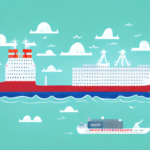Introduction: Overview of the Shipping Industry
The shipping industry, one of the oldest and most pivotal sectors in the global economy, has navigated a decade marked by significant challenges and transformations. From the aftermath of the 2008 financial crisis to ongoing geopolitical tensions, the industry has demonstrated remarkable resilience and adaptability. As of 2023, the global shipping industry continues to expand, driven by evolving market demands and technological advancements. In this article, we delve into the fastest-growing shipping companies of 2023, examine the key factors propelling their growth, and explore the challenges and opportunities that lie ahead.
The Importance of Shipping in Global Trade
Shipping is the backbone of global trade, responsible for transporting approximately 90% of world merchandise by volume, according to the International Chamber of Shipping. This sector not only facilitates international commerce but also significantly contributes to the global economy by creating millions of jobs and generating substantial revenue.
However, the industry faces environmental scrutiny, with shipping accounting for nearly 3% of global greenhouse gas emissions. This has intensified the push for sustainable practices, compelling companies to innovate and adopt greener technologies to mitigate their environmental impact.
Key Factors Driving Growth in Shipping Companies
1. Increasing Demand for E-commerce
The exponential growth of e-commerce has been a major catalyst for the shipping industry's expansion. As online shopping becomes increasingly prevalent, the demand for efficient and reliable shipping services has surged, driving companies to enhance their logistics and supply chain capabilities.
2. Globalization and Trade Expansion
Globalization continues to fuel the need for seamless international trade. As businesses expand their reach across borders, the need for robust and efficient shipping networks becomes paramount, fostering growth among shipping companies that can offer comprehensive global services.
3. Technological Advancements
Innovations such as autonomous ships, blockchain for supply chain transparency, and big data analytics have revolutionized the shipping industry. These technologies enhance operational efficiency, reduce costs, and improve safety, positioning companies at the forefront of the market.
4. Sustainability and Environmental Initiatives
With increasing regulatory and societal pressure to reduce carbon footprints, shipping companies are investing in sustainable practices. The adoption of alternative fuels, energy-efficient ship designs, and advanced emission control systems are key strategies driving growth in this area.
Leading Shipping Companies in 2023
Maersk
As the world's largest container shipping company, Maersk has consistently led the industry through strategic acquisitions and technological investments. In recent years, Maersk has focused on digitizing its supply chain management to enhance efficiency and customer service.
Mediterranean Shipping Company (MSC)
MSC, the second-largest container shipping company globally, has expanded its fleet and network, particularly emphasizing trade routes between Asia and Europe. Its commitment to sustainability and modernizing its fleet has bolstered its market position.
CMA CGM
CMA CGM has made significant strides in expanding its global footprint through acquisitions and the integration of digital solutions. The company's focus on eco-friendly shipping practices has also contributed to its growth.
Hapag-Lloyd
Hapag-Lloyd remains a key player with its extensive network and state-of-the-art fleet. The company's investments in digital platforms and green technologies have reinforced its competitive edge.
Evergreen Line
Evergreen Line continues to grow by specializing in certain trade routes and enhancing its service offerings. Its strategic expansion into emerging markets has been a significant factor in its growth trajectory.
Niche Market Leaders
Companies like Grimaldi Group and ZIM Integrated Shipping Services cater to specific markets such as vehicle transport and Middle Eastern trade routes, respectively. Their specialized services enable them to capture and dominate niche segments within the broader shipping industry.
Technological Innovations Shaping the Future
Autonomous Ships
Autonomous vessels are set to revolutionize maritime transportation by reducing human error, lowering operational costs, and enhancing safety. Trials of autonomous ships are underway, with potential mass adoption expected within the next decade.
Blockchain Technology
Blockchain offers unparalleled transparency and security in supply chain management. By implementing blockchain, shipping companies can streamline documentation processes, reduce fraud, and improve traceability of goods.
Big Data Analytics
Utilizing big data allows shipping companies to optimize routes, predict maintenance needs, and enhance decision-making processes. This data-driven approach leads to increased efficiency and cost savings.
Drone Delivery
While still in the nascent stages, drone technology holds promise for the shipping industry, particularly in last-mile delivery services. Drones can expedite deliveries, especially in remote or congested urban areas.
Regional Growth of Shipping Companies
Asia Pacific
The Asia Pacific region remains the epicenter of shipping growth, driven by the robust economies of China, India, and Southeast Asian nations. Companies like China Ocean Shipping Company (COSCO) are leading the charge with expansive fleets and strategic port investments.
Europe
European shipping giants such as Maersk and MSC continue to experience growth by enhancing their European trade networks and investing in sustainable technologies to meet regional environmental standards.
Middle East
In the Middle East, companies like Emirates Shipping Line and Gulf Agency Company are expanding their operations, capitalizing on the region's strategic location and burgeoning trade activities.
North America
North American shipping companies, including FedEx and UPS, are expanding their logistics and transportation services to meet the growing demands of e-commerce and domestic trade.
South America
Brazilian firms such as Petrobras and Vale are investing heavily in shipping operations to support the continent's expanding commodity exports and infrastructure developments.
Challenges and Future Opportunities in the Shipping Industry
Challenges
- Trade Wars and Tariffs: Geopolitical tensions and trade disputes can disrupt shipping routes and increase operational costs.
- Environmental Regulations: Stricter emissions standards require significant investments in greener technologies and can impact profitability.
- Competition from Other Transportation Modes: The rise of air cargo and rail freight, especially for high-value and time-sensitive goods, presents competitive challenges.
Opportunities
- Growth of E-commerce: Continued expansion of online retail offers vast opportunities for shipping companies to innovate in logistics and delivery services.
- Technological Advancements: Adoption of cutting-edge technologies such as AI, IoT, and robotics can drive efficiency and open new service avenues.
- Emerging Markets: Expanding into developing regions with increasing trade activities can provide new revenue streams.
- Sustainability Initiatives: Investing in green technologies not only meets regulatory requirements but also aligns with consumer demand for environmentally responsible practices.
Conclusion: Future Predictions for the Shipping Industry
The shipping industry stands at a crossroads, balancing growth opportunities with formidable challenges. As global trade continues to evolve, shipping companies must embrace innovation, sustainability, and strategic expansion to remain competitive. Technological advancements will play a crucial role in shaping the future landscape, enabling companies to enhance efficiency, reduce environmental impact, and meet the dynamic demands of the global market. Businesses that successfully navigate these changes and leverage new opportunities are poised to thrive in the ever-evolving maritime sector.






















